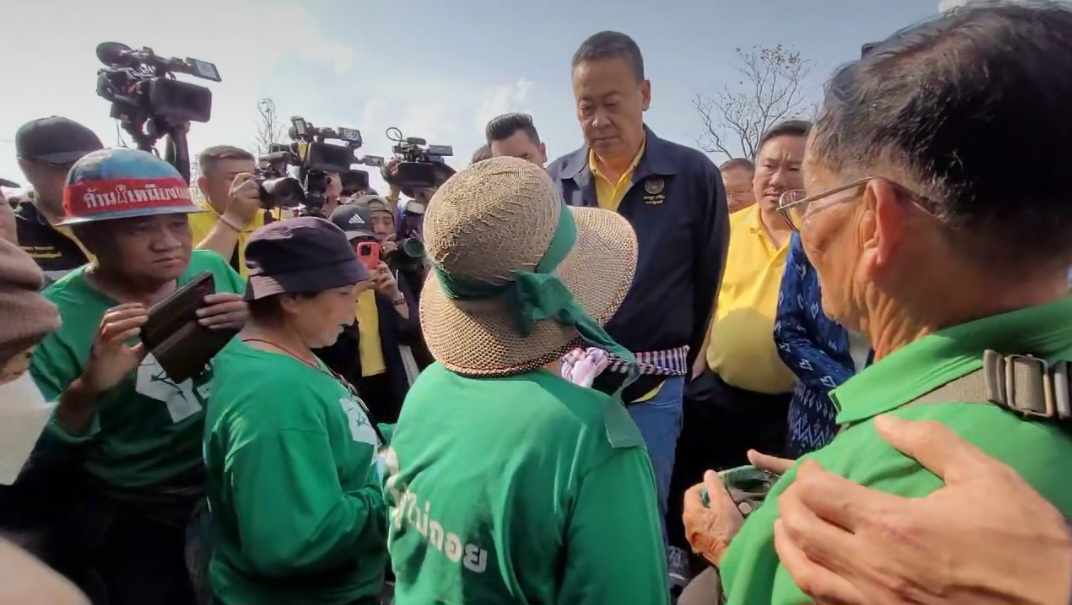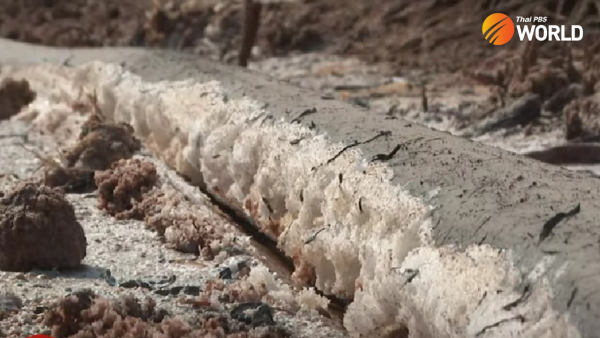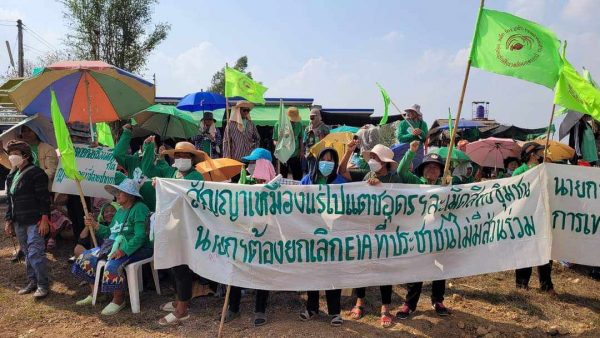Thailand’s race to become a global potash giant leaves bitter taste in Isaan

Residents living around Thailand’s only commercial potash mine warn that Prime Minister Srettha Thavisin’s plan to transform the country into a leading potash producer risks inflicting devastating environmental impacts in the Northeast, also known as Isaan.
“The prime minister talks about how fertilizer prices will drop. But what good will it do if our land becomes infertile?” said Duenrung Munkhuntod, who farms land near the Thai Kali Co mine in Nakhon Ratchasima’s Dan Khun Thot district and is part of the Dan Khun Thot Hometown Lovers Group.
The Thai company won a 25-year mining license in 2015 and has been extracting potash in Dan Khun Thot since 2017. However, it suspended operations after saltwater from mineshafts overflowed into the surrounding soil in 2019. Local environmentalists complained that pollution from the mine was killing their crops and polluting their water supply
At the village of Ban Sap Makham, close to the mine, salt crystals are visible on the ground and trees have withered.
“Eight years ago, my family’s land plot was green and abundant,” Supanee Thong-ulai said.
Today, half of her 29-rai plot is flooded with salty water. The other half is covered with dead and dying plants amid patches of salt crystals. “This white phenomenon is devouring lives in my hometown,” she lamented.

Government gives green light for mining
Adding to locals’ woes is Srettha’s ultimatum that potash mining must accelerate in Thailand. Last November, Srettha declared that three companies that have received potash-mining licenses must begin operations, or the government would revoke their rights and hand them to other miners.
The government claims that Thailand has the fourth-largest reserves of potash in the world, ranking behind only Canada, Belarus and Russia.
It is therefore unhappy at the fact that the kingdom still imports 700,000 tons of potassium each year, costing the country 9 billion baht annually.
The government believes that the launch of commercial potash mining in Thailand would reduce the price of potash-based fertilizer by 15% to 20%. This would save Thai farmers at least 4 billion baht a year. Thailand, meanwhile, would be able to export about 15 billion baht worth of potash to other countries, it claims.
Industry Minister Pimphattra Wichaikul recently instructed the Department of Primary Industries and Mines to give the three licensees a three-month deadline to present their investment plans and timeframe for operations.
“Our goals are to provide Thai farmers with low-cost fertilizer, reduce potash imports, and generate income for the country,” she said.
Potash licensees
Thailand first launched plans to tap its rich potash reserves almost half a century ago. On June 11, 1980, the Cabinet passed a resolution to call for companies’ expressions of interest in potash exploration and production in Thailand’s Northeast.
Thai Agrico Potash, known today as Asia Pacific Potash Corporation Ltd (APPC), sought and received a license covering 120,000 rai of land in Udon Thani province. After identifying two sources with commercial potential, it was granted a 25-year license to extract potash on 26,400 rai from 2022 to 2047. Once launched, its mining operations are expected to generate 2 million tonnes of potash per year.
However, the project has drawn stiff opposition from locals, with some residents saying they are willing to sacrifice their lives to halt the mine and prevent it from destroying their land and livelihoods.

Industry Minister Pimphattra recently visited the site and was met with protests by local environmental networks, who reiterated they would put up a fierce fight against the project.
The third potash-mining license belongs to ASEAN Potash Chaiyaphum Co. It received a 25-year license in 2015 but is still in the process of raising funds to begin extraction operations in Chaiyaphum.
Outcry over environmental impacts
Tests on the soil in the village of Ban Nong Sai, which is located next to Thai Kali’s potash mine in Nakhon Ratchasima, have shown levels of salinity higher than in seawater. Crops no longer grow in the soil here and houses and temples suffer corrosion-related damage from the salty ground.
Even worse is the fact that locals can no longer use local water sources for consumption.
“We used to rely on a simple waterworks system in our village, which cost us just 10 baht per unit. But when local water sources became salty, we had to switch to a private operator who charges us 25 baht per unit,” said Thanawan Kainok, a member of the We Love Dan Khun Thot Group.
She said that when locals complained about the problems, instead of addressing their concerns, the mining company threatened to file lawsuits against them.
“Only a few residents got proper compensation. The rest have been forced to fight, fearing for the worst,” Thanawan said.
Local people were also opposed to the potash mine because they didn’t need chemical fertilizers for their already-productive organic farms, she added.
Last year, the Pollution Control Department (PCD) measured salt levels in water samples taken from near the potash mine at 60 parts per thousand (ppt). Seawater has an average salinity level of 35 ppt. Some of the samples tested by the PCD were too high in salt to register a reading. The test results clearly showed that local water sources were no longer suitable for human consumption or farming.
Analyses of silt and water samples by the Ministry of Higher Education, Science, Research and Innovation also showed that soil and water around the potash mine were highly contaminated with two chemical salts – sodium chloride and potassium chloride.
Jutamas Srihutthaphadungkit, from a network calling itself the guardian of Thai people’s mineral resources, said the prime minister’s ultimatum was bypassing the process to assess the real impacts of potash mining and seek just solutions for all stakeholders.
“All of a sudden, the process is trying to exclude people,” she said.
Parinya Soisungnoen, a member of the Dan Khun Thot Hometown Lovers Group, said that if he were the prime minister, he would look into the problems and find solutions before trying to push the launch of potash mining.
Jutamas said her network was now compiling information to sue Thai Kali for failing to comply with environmental impact assessment and other regulations.
“If the potash mine was beneficial, no one would protest against it,” she said.
People in Sakon Nakhon have also come together to block a Chinese firm from seeking a license to operate a potash mine in their hometown too. They have already submitted a petition to Srettha.
By Thai PBS World’s General Desk






